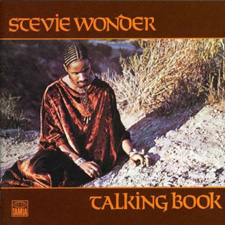One of the great cross-over records of all time, Stevie Wonder’s Talking Book shattered the myth that R & B artists were incapable of dishing out something even the hardest of rock audiences could appreciate. When Wonder hit the road with the Rolling Stones in 1972, the soulful textures he’d been cooking up were winning over audiences of all creeds and colors. After the tour, Talking Book came out and became an immediate hit. Even the cover of the album depicts Wonder in a more ubiquitous light – the manicured corn rows, Indian jewelry and velvet afghan were not the usual makings of a Motown recording artist.
Sandwiched between Music Of My Mind and Innervisions, Talking Book was part of Wonder’s initiation into the unexplored regions of his musical capabilities. Having seized more artistic freedom from Motown, Wonder not only took over the production reins, he also played most of the instruments. Talking Book is sharply defined by Wonder’s amazing keyboard work, especially with the synthesizers he incorporated, giving the music a far funkier edge (check out “Maybe Your Baby”). Then again, the swinging acoustic guitar and harmonica embellishments – both courtesy of Wonder – on “Big Brother” defy categorization. All this and the drums too. Not bad for a guy who can’t see what he’s doing, relying solely on his inner vision of sound and feel.
Wonder gets plenty of solid backing from a number of articulate background vocalists, percussionists and guitarists like Ray Parker, Jr. and Jeff Beck. But the two #1 hits – the dazzling “You Are The Sunshine Of My Life” and the ferocious funkster “Superstition” (a track Beck himself went on to record with Tim Bogert and Carmine Appice a few months later), are mostly Wonder – inside and out. The CD’s closing track, “I Believe (When I Fall In Love It Will Be Forever),” like the CD’s opener, leaves things on a definitive high note. And even though his universal sentimentality hasn’t always been an appealing part of his subsequent work, Wonder’s unpredictability and musical acuteness indicates that we haven’t heard the last of something great from this monumental artist.
~ Shawn Perry




















